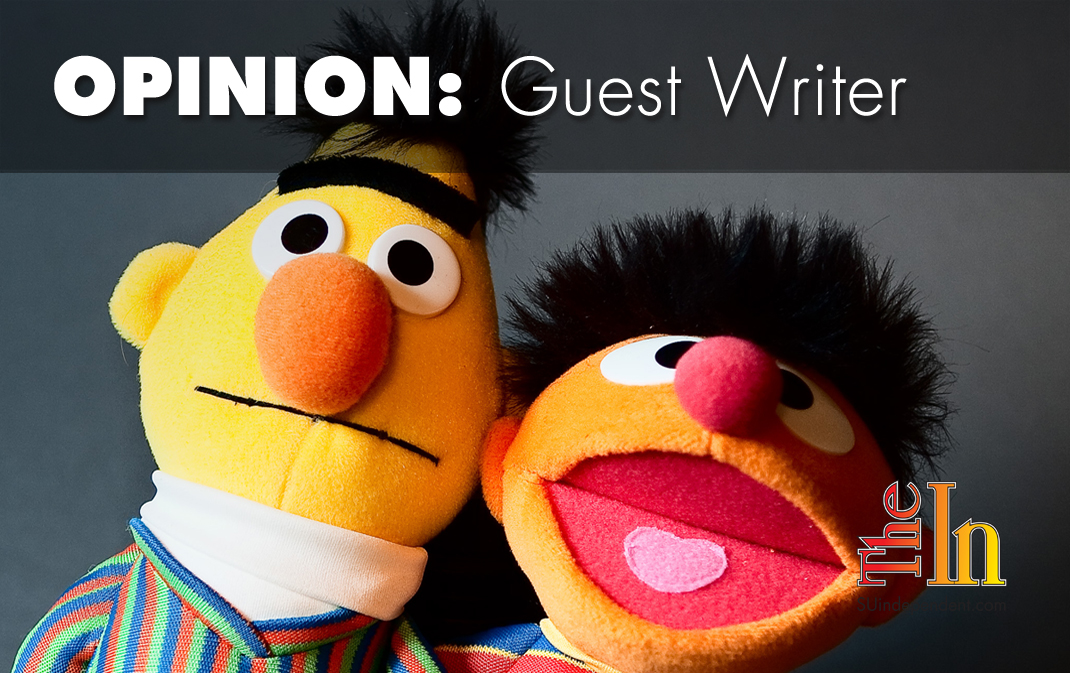
Bert and Ernie supposed to teach ABCs, not LGBTQ
By Christine Flowers
Bert and Ernie are not gay. That I even have to say this is the problem, not the actual fact that they aren’t.
This week, longtime “Sesame Street” writer Mark Saltzman revealed that he wrote Bert and Ernie’s relationship as that of “a loving couple” and based it on his own relationship with film editor Arnold Glassman.
Soon after, Sesame Workshop took to Twitter with a denial — not just of Bert and Ernie’s romantic relationship but of the very concept of sexual orientation for puppets.
I’m with them.
It always seemed evident to me that Bert and Ernie were not gay because of the way they dressed. Clearly, neither of them would have fit in on “Queer Eye for the Straight Guy.” (Though Kermit might be the Muppet most likely to be the target of a questionable #MeToo accusation from you-know-who.)
Have I offended you with the non-PC references yet? Christine, how dare you suggest that gay men must be well dressed? And that not-so-veiled reference to Miss Piggy and the possibility that she’d lie? How dare you! Puppets must be believed!
I’m obviously joking.
Frankly, I find it easier to laugh about the topic than to take it seriously. Of course Bert and Ernie aren’t gay. They’re just sweet, nebbish little animated socks who had to split the rent on a fourth-floor walk-up.
But these days, we need to worry about the backstories and implications of everything from Supreme Court nominees to animated socks.
There is no question that “Sesame Street” has been on the cutting edge of diversity and inclusivity since the beginning. Over the years, the show included characters that reflect different demographics such as Julia the autistic Muppet, Muppets who had accents (other than the Count because there isn’t a huge lobby for Transylvanians in the U.S.), and Muppets whose parents were divorced. From the beginning, the human characters such as Maria, Gordon, and Mr. Hooper were of different ethnicities, and some of the vignettes were in Spanish, which was very exotic for 1969, when the show started. Teaching kids from an early age that everything and everyone has value is unquestionably one of the most positive lessons Sesame Street can impart on its viewers.
But “Sesame Street” is not — and should not be — in the business of helping kids explore their sexuality. It’s always been a show geared to the youngest of the young, the toddler set who were too tiny to really understand sex at all. No 3 or 4 or 5 year old should have to deal with a topic that will cause them decades of angst later in life.
Children shouldn’t be forced to acknowledge their sexuality as toddlers. That’s not a burden that should be placed on their young shoulders. I call it a “burden” not because we should have a negative view of different forms of sexuality but because children should not have to think about those concepts while trying to figure out what number comes after “7” or what letter comes after “K.”
I’m tired of adults turning childhood into some version of “The Real Housewives of Sesame Street.” Reality is a good thing, but children should be able to suspend it for the first few, sweet years. Making Bert and Ernie’s sexual orientation an issue deprives the prime audience of “Sesame Street” of living an unencumbered childhood.
The creator of the Muppets, Frank Oz, has denied that the pair is gay.
The LGBTQ community is angry.
To that I say, just wait. The kids will learn about those other letters soon enough.
The viewpoints expressed above are those of the author and do not necessarily reflect those of The Independent.
How to submit an article, guest opinion piece, or letter to the editor to The Independent
Do you have something to say? Want your voice to be heard by thousands of readers? Send The Independent your letter to the editor or guest opinion piece. All submissions will be considered for publication by our editorial staff. If your letter or editorial is accepted, it will run on suindependent.com, and we’ll promote it through all of our social media channels. We may even decide to include it in our monthly print edition. Just follow our simple submission guidelines and make your voice heard:
—Submissions should be between 300 and 1,500 words.
—Submissions must be sent to editor@infowest.com as a .doc, .docx, .txt, or .rtf file.
—The subject line of the email containing your submission should read “Letter to the editor.”
—Attach your name to both the email and the document file (we don’t run anonymous letters).
—If you have a photo or image you’d like us to use and it’s in .jpg format, at least 1200 X 754 pixels large, and your intellectual property (you own the copyright), feel free to attach it as well, though we reserve the right to choose a different image.
—If you are on Twitter and would like a shout-out when your piece or letter is published, include that in your correspondence and we’ll give you a mention at the time of publication.
Articles related to “Bert and Ernie supposed to teach ABCs, not LGBTQ”
Encyclopedia Britannica publishes 1,000-volume “Encyclopedia of Pronouns”



